Student Interviews
Are you interested in finding out more about the Master’s Programme in Sociology? Read our interviews with former students from the programme.
“Have fun and enjoy your studies!”
Name: Mikael Karlsson
Age: 32 years
Lives: Skåne, Sweden
Occupation: Lecturer and Researcher at the Department of Gender Studies, Lund University
Education: MA Degree in Sociology 2014, Doctoral Degree in 2020.
What are you doing right now?
I’m teaching and researching within gender studies. In November last year, I finished my doctoral dissertation on groups struggling for sexual rights for people with norm-breaking functionality. I interviewed and participated in activities in the functional rights movement, the sexual policy movement and the LGBTQ movement in Sweden. With my research I want to understand what it is like to be active in a civil society experiencing neoliberal social change.
After finishing my dissertation, I have mostly taught feminist theory and method for bachelor and masters students at Lund University.
How have your studies in sociology contributed to what you do today?
In every possible way! The education provided a good foundation both in terms of method and theory, but above all I learned a lot about research on social movements. Several of the books we used as course literature then came to inspire the research I carried out as a doctoral student.
Have the studies in sociology affected you in other ways?
My study time was full of activism and social associations. It taught me a lot that I have included in my research on civil society and social movements.
My study time was full of activism and social associations. It taught me a lot that I have included in the research on civil society and social movements.
How did you experience your time as a student in Gothenburg?
In addition to the fact that it rains a little too much, Gothenburg is the best student city. It's a great city in general.
Do you have contact with your old classmates?
I'm still friends with some of my classmates. Unfortunately, we have not been able to meet during the pandemic but we still keep in touch. I know several who today work as investigators in the public sector, another is programme leader in a major civil society organization and several are doctoral students.
Why did you choose the MA programme in sociology at the University of Gothenburg?
I read many elective courses in my bachelor's degree. After that, I looked for something more structured helping me to understand society on a deeper level. I was already very interested in social movements and therefore the Department of Sociology in Gothenburg was an obvious choice.
Do you have any advice for those who are considering applying to the programme?
Do what you are really interested in and don't be too pragmatic. Have the courage to focus and immerse yourself even in obscure things that no one thinks you can get research funding for. Start a study circle to talk about things that you think don’t get enough attention during the courses.
Have fun and enjoy your studies!
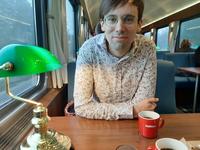
More about the programme
Contact
Viktoria Holm
STUDY COUNSELLOR
+46 31-786 47 96
viktoria.holm@socav.gu.se
“The beauty of sociology is that it's very much about thinking and reflecting on the world around us”
Name: Tatjana Graf
Age: 28 years
Lives: Lucerne, Switzerland
Occupation: Doctoral Student at the Department of Sociology, University of Lucerne
Education: MA Degree in Sociology 2021
What are you doing right now?
After graduating in 2021, I applied for various doctoral positions and was finally accepted for a research project in economic sociology. The project takes a closer look at how payment systems in both Switzerland and Sweden are changing with the ongoing digitalization. In addition to cash, cards and bank transfers, there are now more and more digital services that we use every day. In my project, I am trying to understand how this affects people's handling of money and the perception of money in everyday life.
How have your studies in sociology contributed to what you do today?
I got a very good insight into what it is like to do research and through all the courses and assignments I was able to test whether a doctoral position would be something for me. And it was! Basically, my job as a doctoral student is to learn new things and try to understand a certain topic "a bit" better – a wonderful job I think! Moreover, I had very dedicated teachers who inspired me to pursue a doctoral position after graduation. I am grateful for that.
Have your studies in sociology affected you in other ways?
The great thing about studying sociology is that it's very much about thinking and reflecting on the world around you. I think it's a very cool (and sometimes frustrating) experience to understand that many things are not just what they seem, but that there are often underlying factors such as historical events or power relations between different social groups. Those things contribute to how we see ourselves and the world we live in.
During my studies, I also learned to think in a certain way, to reflect and organize my thoughts and ideas. This is something I appreciate, not only at work, but also in my everyday life.
During my studies, I also learned to think in a certain way, to reflect and organize my thoughts and ideas. This is something I appreciate, not only at work, but also in my everyday life.
How did you experience your time as a student in Gothenburg?
One great thing was all the different courses and the teachers I had. Because of the pandemic, a lot took place on Zoom, but I also met great people (now my friends) who made it even more fun to study the master program. I was used to the German university system, which is a bit different. In Sweden, the courses and program structure are more rigid, but I got used to it pretty quickly. There is also less hierarchy between students and teachers in Sweden. The atmosphere on the program was very relaxed which I liked a lot.
Why did you choose the MA program in sociology at the University of Gothenburg?
During my bachelor, I studied both political science and sociology in Berlin, but I quickly felt that sociology was what I wanted to pursue. It focused more on what happens in everyday life, and that is what I find most exciting. I applied for both the master's program in Stockholm and Gothenburg, but I felt that the department in Gothenburg had more focus on qualitative research and that was something I wanted to learn more about.
Do you have any advice for those who are considering applying to the program?
If you are curious about how society works, go for it! It may not lead to a specific job or profession afterwards, but you will gain various valuable skills, such as critical thinking, reflection and the ability to form your thoughts in writing and speech. It may sound very banal but it feels wonderful to be able to really express what you think!
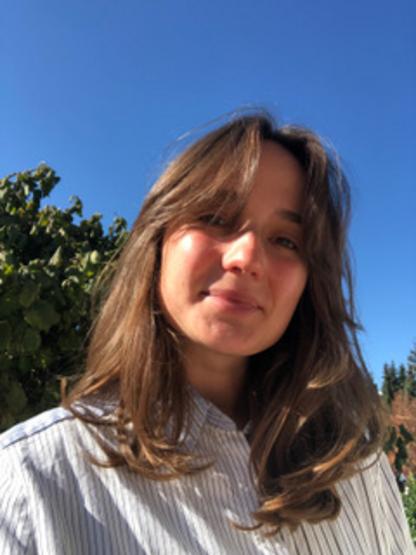
More about the programme
Contact
Viktoria Holm
STUDY COUNSELLOR
+46 31-786 47 96
viktoria.holm@socav.gu.se
Supporting Local Involvement in Housing Issues
Name: Thomas Grinderslev
Age: 29 years
Lives: Alingsås, Sweden
Occupation: Housing Consultant
Education: MA Degree in Sociology 2019
What are you doing right now?
I work within the Swedish Tenants' Association as a housing consultant. My role is to try to promote local involvement in different residential areas, so that it will be even better for the tenants to live there.
It is important to grasp the issues, needs and challenges that exist in an area, and be involved in pursuing visions together with the tenants. It can be anything from counteracting racial tensions, contesting evictions connected to major renovations, establishing local tenants' associations and arranging social activities as well as meetings between landlords and tenants to discuss what can be improved in an area - Simply work creating greater influence for tenants and thereby contributing to a better society.
How have your studies in sociology contributed to what you do today?
The education gave me many useful perspectives and tools in order to understand situations that arise in a residential area. Such as understanding different social groups, power relations between different actors, issues of justice, racism, and other social issues found in the housing market. The studies have given me perspective on what motivates people to get involved in changing their life situation, but also the opposite: why some people can feel powerless and alienated in everyday life.
The studies have given me perspective on what motivates people to get involved in changing their life situation, but also the opposite: why some people can feel powerless and alienated in everyday life.
I wrote my master's thesis on how social sustainability is conceived and enacted in various housing companies and afterwards I have continued to collaborate with researchers at the university. The thesis gave me the opportunity to immerse myself in many exciting theories, which in the end have given me a job!
Have your studies in sociology affected you in other ways?
I studied for a bachelor's degree in anthropology before my master's in sociology, and together these degrees have given me a complex understanding of society and fellow human beings. They have enabled me to see the world from different perspectives, and have challenged my previous preconceptions about how society works.
How did you experience your time as a student in Gothenburg?
It was a great time in many ways! I’m Danish and moved to Gothenburg at the age of 25 to be closer to my girlfriend.
Starting the master's programmeme immediately after the move was quite wonderful, finding people to hang out with, but at the same time challenging because most of them already had well-established lives and circles of friends in the city. But Gothenburg is fantastic to live in, there is a lot to discover and do, and as soon as I moved into a student residence, I made many friends.
Do you have contact with your old classmates?
Actually not, because my wife and I got married three days after submitting my master's thesis and moved to another city, but I know that some work in different authorities and administrations and that others have continued with research.
Why did you choose the MA program in sociology at the University of Gothenburg?
After studying anthropology in Aarhus (Denmark), I felt that I needed an education that was more comprehensive and at the same time more aimed at a European context. Sociology seemed to be the answer to my questions, and I think that has been true in many ways!
Do you have any advice for those who are considering applying to the programme?
My advice would be to think about what you are genuinely interested in. What do you want to understand better? Can sociology give you tools to understand these issues? Of course, it can be difficult to answer what sociology can do, but it can in any case do much more than you might think!
Of course, it can be difficult to answer what sociology can do, but it can in any case do much more than you might think!
Studying sociology rarely gives a certain job, but if you are interested in some specific questions, which you could consider working on later, I think that sociology can develop your skills very much and provide good opportunities for exciting jobs!
Working life outside the university is quite different from the somewhat idealistic university environment, but I think that if you try to immerse yourself in your interests and think about how to explain your skills to people outside the university, then there are definitely many interesting opportunities out there!
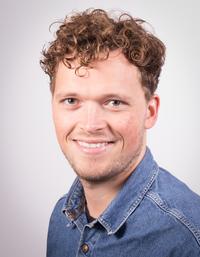
More about the programme
Contact
“The idea of research had never struck me”
Name: Jens Millkrantz
Age: 31 years
Lives: Gothenburg, Sweden
Occupation: Doctoral Student at Chalmers University of Technology
Education: MA Degree in Sociology 2016
What are you doing right now?
I am a doctoral student in the history of technology at Chalmers, writing a dissertation on the history of the Swedish oil industry during the 1930s and 40s. I am particularly interested in the Social Democrats' attempts to make the oil industry a socialistic project. The idea is to link history to contemporary discussions about oil and society, path-dependence and a fossil-free future.
How have your studies in sociology contributed to what you do today?
The time at the Department of Sociology was absolutely crucial for me in order to become a doctoral student. The idea of research would never have struck me if it had not been for my teachers and classmates. In addition, a master's degree is a requirement for admission to the doctoral programme. More generally, the education gave me a solid introduction to science and technology studies (STS) and environmental sociology, which proved to be very useful for my current work.
Have your studies affected you in other ways?
Studying sociology and STS opened new horizons, as they call it. It shaped my worldview and my interests in many ways. During my studies this idea crystalized, that someone like me can actually be a researcher.
During my studies this idea crystalized, that someone like me can actually be a researcher.
How did you experience your time as a student in Gothenburg?
I lived in Gothenburg for many years before I started studying at GU, so I never had the opportunity to experience the city "from the outside", as a new student in a new city. Many of my friends and family live in the city, which meant that I did not fully participate in the social activities organized by the student union and such. But I enjoyed GU very much, and the west coast is the best coast.
Do you have contact with your old classmates?
I have occasional contact with several, who are doing a number of different things. Some are doctoral students in various subjects, others have jobs in the public sector or the cultural sector.
Why did you choose to study the MA program in sociology at the University of Gothenburg?
During my bachelor's, I floundered around on various courses in international relations, social studies, cultural studies and, finally, sociology. I think you have to do that. How else will you find out what you are really interested in? In any case, I eventually earned a bachelor's degree with a focus on sociology. I felt like coming home and fell in love with sociological theories. Continuing to study sociology after the wandering bachelor period felt like a given.
Do you have any advice for those who are considering applying to the program?
I think the most important thing is to follow your interests. Try not to think too strategically or instrumentally in your choice of education. If you are interested in sociology or want to understand more about how society works, then go for it! You will be welcomed by a fantastic and inspiring department.
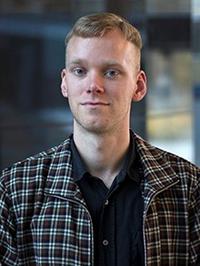
More about the programme
Contact
Viktoria Holm
STUDY COUNSELLOR
+46 31-786 47 96
viktoria.holm@socav.gu.se
Studying Emotions and Objectivity in Court
Name: Cecilia Nordquist
Age: 31 years
Lives: Stockholm, Sweden
Occupation: Doctoral Student at the Department of Sociology, Uppsala University. JustEmotions: The Construction of Objectivity
Education: MA Degree in Sociology 2018
What are you doing right now?
I’m working in an international project that examines objective decision-making in law courts, with a specific focus on judges and prosecutors. My focus is how we can understand objective decision-making from an emotional perspective, especially in relation to interaction and pace.
I have just returned from the USA where I collected material for the project and for my dissertation. With covid-19, I, like everyone else, have had to re-think and am now in a stage where I will start analyzing my data based on the ideas that have arisen in the field.
How have your studies in sociology contributed to what you do today?
Since I am still studying and working as a doctoral student, my previous studies have been crucial for my current job. At my very first sociology lecture a teacher asked if anyone had thought of doing research, and it was probably in some way then, by raising my hand, that it became imaginable to me.
Have your studies affected you in other ways?
In addition, my studies gave me some of my best friends, perhaps because we have similar ways of looking at the world. Or because we had the same schedules ... Regardless, both parts have affected me enormously. Friendship and perspective on society.
In addition, my studies gave me some of my best friends, perhaps because we have similar ways of looking at the world.
How did you experience your time as a student in Gothenburg?
I enjoyed Gothenburg and my time there as a student, but I was probably a rather untraditional one. I was not particularly interested in student life but spent a lot of time in voluntary organizations and worked in restaurants, where I also thought I would stay for a long time. But, that obviously did not happen.
Do you have contact with your old classmates?
Yes I do. I remember many were interested in doing a doctorate and that many continue to see it as a future goal, so I look forward to additional doctoral colleagues!
Why did you choose the MA program in sociology at the University of Gothenburg?
It was in line with my goal, to do research. But before that I had only studied sociology for a year, so I was unsure if I would get accepted. I heard several times during my bachelor in the humanities that what I wrote about was more sociological than humanistic, it was a natural step to switch to sociology and then continue on that path.
Do you have any advice for those who are considering applying to the program?
Apply! And when you are accepted - let your interest come first.
Dare to ask, discuss, make mistakes and take "the road less travelled" when shaping your future. No matter how much of a cliche that might sound.
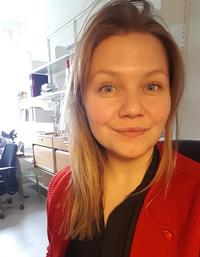
Contact
Viktoria Holm
STUDY COUNSELLOR
+46 31-786 47 96
viktoria.holm@socav.gu.se